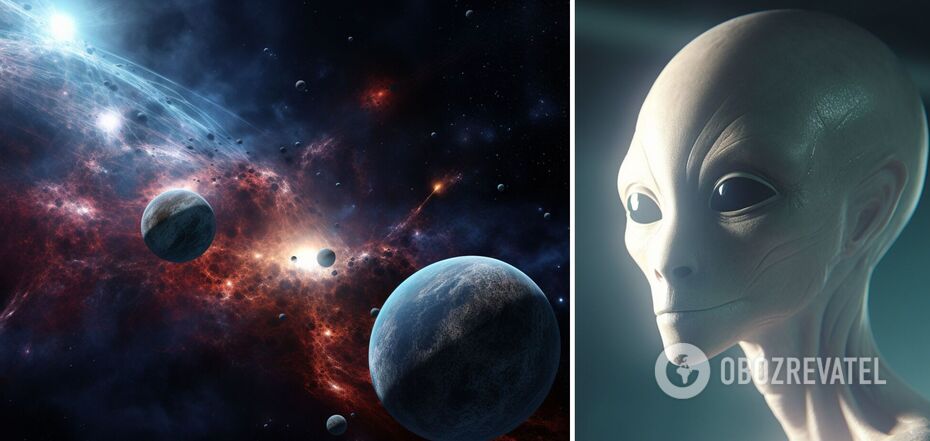Life
Humans will find evidence of alien life in the next 10 years: but it won't be "little green men"
In the next decade or so, humanity may find evidence of life beyond our planet. However, it is unlikely to be humanoid little green men or pointy-eared Vulcans, so many people whose imaginations have already been fuelled by science fiction films may be somewhat upset by the discovery.
This opinion was expressed by University of Arizona astronomer Chris Impey, UniverseToday reports. He also doubts that humanity can receive signals from other intelligent alien species in the near future.
Impey pins his main hope for the discovery of aliens on NASA's James Webb Space Telescope or one of the giant telescopes on Earth. The astronomer is convinced that it is thanks to this technique that spectroscopic signs of biological activity will be detected in the atmosphere of an exoplanet located light years away.
Spectroscopy is the study of radiation bands in the atmosphere of distant planets, which allows scientists to determine its composition.
At the same time, he acknowledges that spectroscopic data is not attractive to the general public, no matter what it may indicate.
"People love pictures, and so spectroscopy never gets the attention it deserves in general conversations about astronomy or science because it's a little more esoteric," said Impey.
The scientist notes that it was only 30 years ago that humanity first discovered an exoplanet, and now we know of more than 5,000 planets outside our solar system, and one of them may be home to alien life.
Impey says that he had previously expected the first signs of alien life to be found on Mars, thanks to NASA's plans to bring samples back to Earth for detailed study. But these plans have run into budgetary constraints, so it will likely take longer to find evidence of biological activity on the Red Planet, if it does exist.
The astronomer also suggests that alien life may be hiding in the hidden oceans of Europa, a moon of Jupiter, or Enceladus, a moon of Saturn. But they will begin to be studied after the 2030s.
By that time, Impey suggests, scientists will be analysing spectroscopic signs of life that they will receive through telescopic observations of exoplanets. To do this, scientists will have to identify the chemical signatures of compounds found in the atmospheres of exoplanets. This is quite a difficult task, but the James Webb Telescope has already proven to be very helpful in this regard. The situation will be further improved by other telescopes that are due to be launched over the next seven years, including the Ruby Observatory, the giant Magellan telescope and the Very Large Telescope.
Biological activity on an exoplanet, Impey explains, would be indicated, for example, by a higher-than-expected percentage of oxygen.
Telescopes can detect not only biosignatures but also technosignatures. For example, if scientists detect an increased level of chlorofluorocarbon or abnormal heat emissions in the atmosphere of an exoplanet, it means that it may not just be a biological life form, but an alien civilisation that faces the same environmental problems as humanity on Earth.
He notes that ideally, scientists would need to find several pieces of evidence at once to prove the existence of life on an exoplanet.
Impey suggests that of all the exoplanets discovered, signs of life could be found on "half a dozen or a dozen planets that say the same thing". But he also does not rule out that it may turn out that "a lot of habitable planets are dead, and that's a possibility that everyone should be prepared for."
"This is a complex experiment, and so the data will be ambiguous. It may not be enough to convince some people. And that, of course, depends on what the data says," Impey acknowledged.
As for intelligent aliens, he predicts that evidence of their existence may appear in the next 50 years or so. At the same time, he calls this search very difficult.
"It's very difficult because the methods you use include technologies like radio, lasers, etc. What if they don't have radios or lasers?" - the scientist asked rhetorically.
He also advises us to be prepared for the fact that if no evidence of extraterrestrial life in any form is found by 2073, it may be the answer to one of the main questions of humanity: are we alone?
"At some point, a null result makes sense. It simply means that they either don't exist or are very rare. And this may happen in 50 years," the astronomer summed up.
Earlier, OBOZREVATEL also told about the theory of scientists that humans and aliens can be so different from each other that an alien species will not even understand that earthlings are living beings.
Subscribe to OBOZREVATEL's Telegram, Viber and Threads channels to keep up with the latest developments.



























